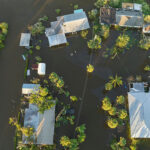COP29: what are the goals to be achieved at the ‘finance summit’?
From November 11 to 22, Baku, the capital of Azerbaijan and host of COP29, will be in the spotlight. This Climate Summit, dubbed the "Finance COP," will focus on climate finance—specifically, how to assist developing countries in meeting their goals and protecting the global economy.

COP29 is increasingly being referred to as the "Finance COP." During the climate summit, scheduled for November 11 to 22, 2024, in Baku, Azerbaijan's capital, the key negotiations will center on funding. Representatives from countries and organizations worldwide will discuss how to secure financing to effectively mitigate climate change, adapt to its impacts, and support the energy transition.
COP, or Climate Summit, is the main event of the United Nations Climate Change Conferences. These meetings focus on how to tackle climate change, meet the goals of the Paris Agreement—keeping global warming below 2°C, ideally closer to 1.5°C, above pre-industrial levels—and implement measures to adapt to its effects, such as rising temperatures and more extreme weather events.
Financing the energy transition
Economics is always a central concern in roadmap meetings. This includes discussing alternatives to fossil fuels, the primary drivers of global warming; addressing justice for developing countries, which have contributed least to greenhouse gas emissions yet suffer the most from their consequences; and securing funding for a transition to a more sustainable energy system.
The objectives of COP29 are largely shaped by agreements made at the previous summit. La COP28 marked a historic moment as it was the first to explicitly call for a transition away from fossil fuels. Delegates agreed, through non-binding commitments, to aim for net zero carbon emissions by 2050 and to triple renewable energy capacity by 2030.
The 2023 summit also endorsed funding for the loss and damage mechanism, which allows wealthier, historically more polluting nations to compensate vulnerable countries for the impacts of climate change on their lands and populations.

Conversely, COP28 left several important issues unresolved that will need to be addressed in 2024. Many topics related to economics and resources were postponed, set to be included in the COP29 agenda, making the upcoming summit, referred to as "the finance COP," a crucial gathering.
The key objectives of COP29
A central issue at COP29 will be climate finance. In 2009, developed countries established a goal to contribute $100 billion annually to support climate action in developing nations. However, as highlighted by the World Resources Institute (WRI) and recent data from the OECD, this target was only achieved in 2022, and the amount agreed upon is now viewed as insufficient.
"The reality is that the financial needs of developing countries far exceed what is currently available to them. That must change at COP29," says WRI. Participants at this year's summit need to focus on the New Collective Quantified Goal (NCQG) to establish a revised financial target that is realistic and adapted to the new needs and circumstances for supporting developing countries from 2025 onward.
"At COP29 in Baku all governments must agree a new goal for international climate finance that truly responds to the needs of developing countries,” says Simon Stiell, Executive Secretary of the United Nations Framework Convention on Climate Change (UNFCCC). “COP29 must be the stand-and-deliver COP, recognising that climate finance is core business to save the global economy and billions of lives and livelihoods from rampaging climate impacts.”
The Minister of Ecology and Natural Resources of the Republic of Azerbaijan and President of COP29, Muxtar Babayev, expressed a similar view. “We must expand access to concessional finance, streamline the pathways to climate funds and leverage these resources to reduce both risk and costs,” he said in an interview with EFE news agency.
“The last major opportunity”
Another key objective of COP29 is for countries to enhance their climate commitments to reduce emissions domestically and adapt to the impacts of climate change. These commitments, known as Nationally Determined Contributions (NDCs), are essential tools for coordinating global climate action.
These contributions must be updated every five years. The next deadline comes a few months after COP29. World Resources Institute noted: “The UN summit in Baku is the last major opportunity to set clear expectations for what this next generation of NDCs should aspire to.”

In addition to these two major objectives, other priorities include finalizing the framework and increasing commitments for the loss and damage mechanism, regulating carbon markets, and implementing Article 6 of the Paris Agreement (which enables countries to voluntarily cooperate to enhance their mitigation and adaptation efforts while promoting sustainable development). Progress is also needed in negotiations on just transition, adaptation plans, food security, and, of course, determining how to take decisive steps toward phasing out fossil fuels.
Additionally, the CEO Climate Leaders Alliance, promoted by the World Economic Forum (WEF), issued a letter signed by over 110 CEOs and senior executives of major companies, including BBVA, urging world leaders and COP29 participants to "double down on climate action." The letter specifically calls on governments and companies to collaborate and tackle challenges, emphasizing that "every fraction of a degree counts" in the pursuit of achieving net zero emissions by 2050.
The role of the host: what is Azerbaijan's climate policy?
COP28 was marked by controversy, criticism, and skepticism. The summit took place in the United Arab Emirates (UAE), the world's seventh-largest oil producer and a member of the Organization of the Petroleum Exporting Countries (OPEC). It was chaired by Sultan al Jaber, the UAE Minister of Industry and CEO of Abu Dhabi's national oil company.
The 2024 climate summit is taking place in a different context: it is being held in Baku, the capital of the Republic of Azerbaijan. This Caucasian nation, situated at the crossroads of Asia and Europe and bordered by the Caspian Sea, has undertaken several measures to make its energy transition a reality.
“Azerbaijan is committed to developing its renewable energy potential, which is a key part of the country's plan to reduce greenhouse gas emissions by 40% by 2050,” according to the official COP29 website. “The country aims to increase its renewable energy capacity to 30% by 2030 and diversify its existing energy system to become a leader in green energy.” The same website highlights Azerbaijan's commitment to updating its NDCs soon to meet the targets of the Paris Agreement.
On the other hand, Zero Carbon Analytics emphasizes the importance of gas production and exports in Azerbaijan's energy sector. In the first half of 2024, the country boosted its exports, particularly to Europe, in line with the goal of reducing the continent's dependence on Russian gas.
Between November 11 and 22, 2024, the world will turn its attention to Baku to closely follow the COP29 meetings, where the future of the global fight against climate change will be shaped.